Bluesfest 2022 review: Midnight Oil, Paul Kelly star at Byron Bay festival return
It was the little things that made me emotional during Bluesfest; things so commonplace at music festivals that I almost walked right by them until I realised what I’d missed.
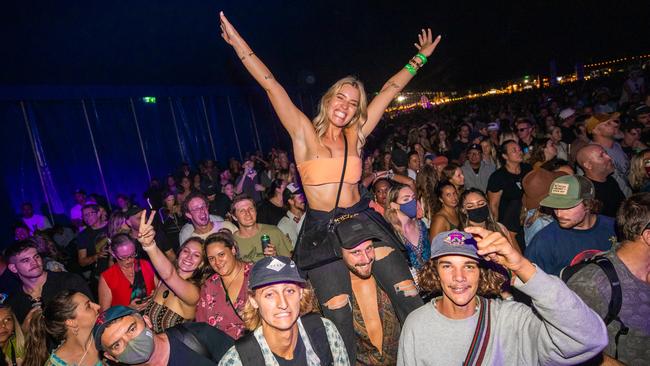
It’s the little things that I found myself getting emotional about during Bluesfest; things so mundane and commonplace at music festivals that I almost walked right by them until I realised what I’d missed.
It was a Saturday evening and the sun had just dropped out of sight when I spotted two teenage girls heading towards Missy Higgins as she began her 2004 song Ten Days, singing the lyrics together and running hand-in-hand to get closer to the action.
This was the moment that made me stop in my muddy boots, halfway between one stage and the next, standing beside the sweet-smelling food stalls near one of the main stage tents.
I watched two young music fans sharing a spark of joy; a flicker of a memory of a song by one of the great Australian singer-songwriters that meant something to them and their lives, and they just happened to be in a place where that artist was playing it live while backed by her rock-steady band. Why wouldn’t they run towards that sound?
Earlier on Saturday at the same stage I saw a mum holding aloft her earmuff-clad child, among a crowd of thousands, as Kate Miller-Heidke sang the dizzying notes of her Eurovision hit Zero Gravity.
At a neighbouring tent not long after that, an imposingly buff Islander bloke double-fisting beer tins politely asked if he could step between my mate and me during Baker Boy’s performance; we shared grins and let him through. Why wouldn’t we?
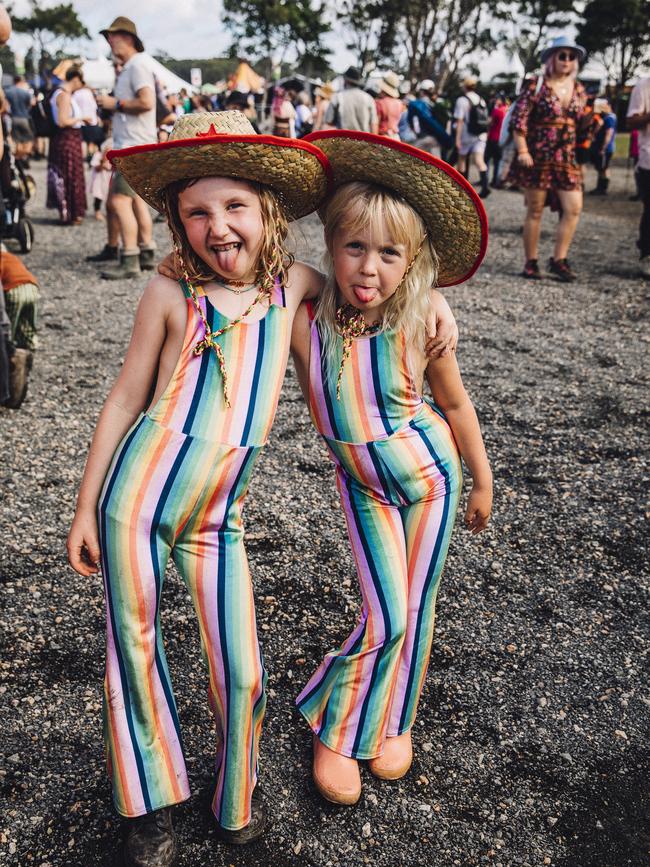
Later, looking down at a crowd of thousands from a high vantage point, I spied a face-painted young girl on her dad’s shoulders, singing along to every word of her favourite Amy Shark song.
Behind them, just outside the tent, a woman in her 20s sang along to the same Shark song while her partner stood smoking, drinking and nodding his head, appearing to have been won over by an act he might have dismissed until this point.
“And it’s been 10 days without you in my reach,” Higgins sang in the chorus of the song that sent the girls running towards her. “And the only time I’ve touched you is in my sleep.”
For Bluesfest, it has been more than 1000 days since the event was last held at these grounds in 2019. Its organisers came cruelly close last year before the festival was cancelled by a NSW public health order after one Covid-19 case had been detected in the Byron Shire.
Campers who had started setting up on site were told to go home. The big tents came down without a musical note being played beneath them. Thousands of white plastic chairs were stacked and carted back out the gates without having been used as seats.
For the nation’s music industry workers, who had been viewing the 2021 edition of the festival as a chance to reset and reboot the stricken sector, it was an unspeakable tragedy. Bluesfest director Peter Noble told me he was traumatised by the brutal nature of that decision, and he was flashing back to those painful memories as the clock ticked down to opening the gates this year.
I got a little emotional while seeing people do all the things we couldn’t do together in places such as this for the past two years, basically.
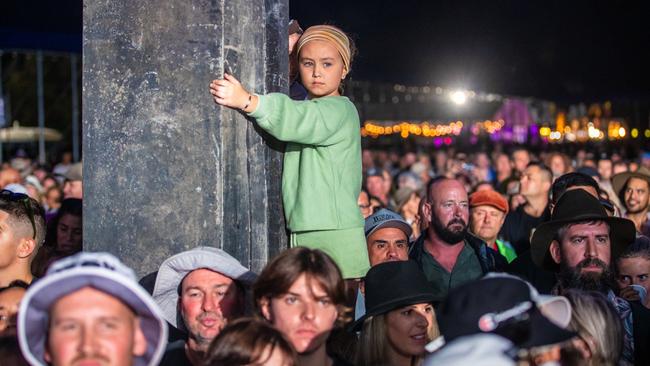
In isolation, the moments I’ve described above may seem trivial, but multiply them by the 99,000 or so people who trekked through the grounds during the five-day event across the Easter long weekend and you’ve got the heartbeat of our nation’s culture.
It has been a long time between drinks for large-scale, unrestricted Australian music festivals – the sort of events that happily dotted the calendar pre-pandemic and had the potential to become defining tentpoles in one’s life, if you went with the right people and saw the right acts.
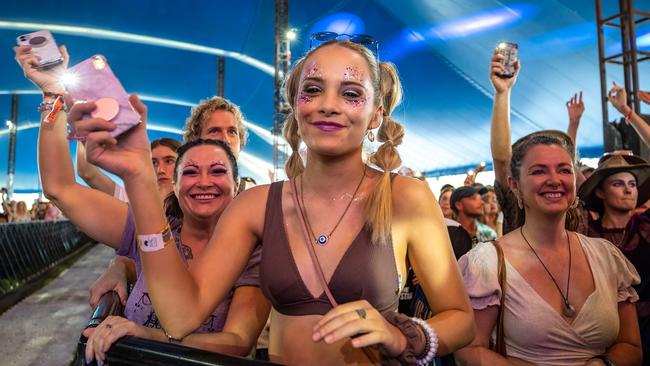
This had the feel of one of those events. Other than abundant hand sanitiser, there were no signs that a pandemic had taken place in the three years since crowds last gathered here. Behind the bar, workers were wearing shirts denoting Bluesfest 2021, the event that never happened. The scars of last year’s aborted event run deep, but with a highly vaccinated population there seems little chance it can happen again.
It was on Good Friday afternoon that I witnessed a glorious full-tent singalong for the first time when the Church played The Unguarded Moment, which frontman Steve Kilbey ironically introduced as “the song that took me from the slums of Canberra to the villas of Switzerland”.
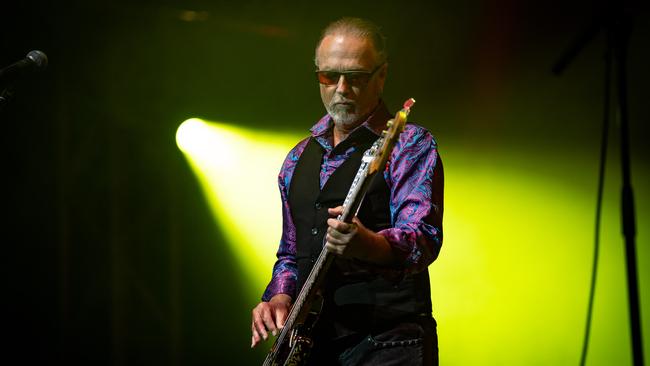
Nearby, Briggs was one of few acts on the bill to fly the flag for hip-hop. Backed by a guitarist, keyboardist and DJ, he wrapped his set with A.B. Original’s track January 26 – the most pointed popular song about changing the date of Australia Day – followed by a song of unity in The Children Came Back, which reinterprets the great Archie Roach song.
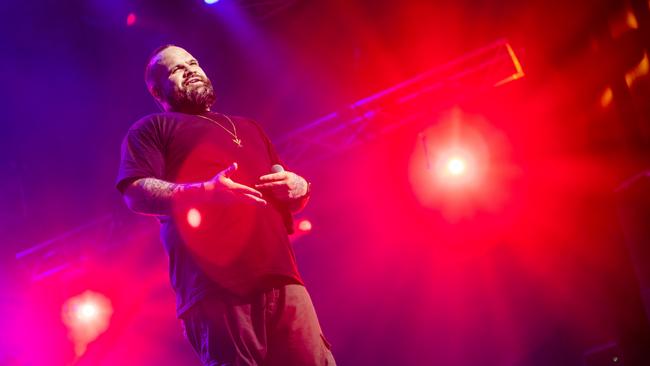
“Where would rock ’n’ roll be without the Saints?” asked the Living End frontman Chris Cheney, before dedicating West End Riot to Chris Bailey, the Brisbane punk rock singer who had died a few days before.
The Melbourne trio’s performance was simply electrifying as it skilfully moved from its own classics, such as All Torn Down and Prisoner of Society, to covers of Tainted Love and a diversion into AC/DC’s T.N.T., with Cheney using a VB bottle on his guitar strings before sculling its contents to cheers. “There are no guarantees in this life, let me assure you, so you’ve got to enjoy the good times when they’re here,” he said.
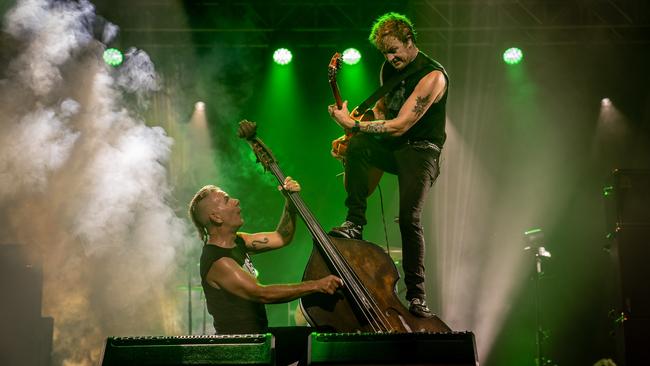
When Midnight Oil began its two-hour set before a tightly packed Crossroads tent crowd, it was thick with old favourites and newies from its 13th album Resist. Nearing the end of its final tour, the quintet – backed by occasional vocalists and a horn section – was in immaculate form, with new song Nobody’s Child sparkling alongside Dreamworld, Stand in Line and 1993 deep cut Now or Neverland.
Singer and former Labor politician Peter Garrett garnered huge cheers when he filleted Scott Morrison – “Mr Marketing, I won’t mention him by name” – accusing him of playing politics with desperate people in the nearby regions affected by the recent floods and blaming him for extra disaster relief payments awarded in Liberal and National seats, declaring it “a new low point from someone who is specialising in low points in his prime ministership”.
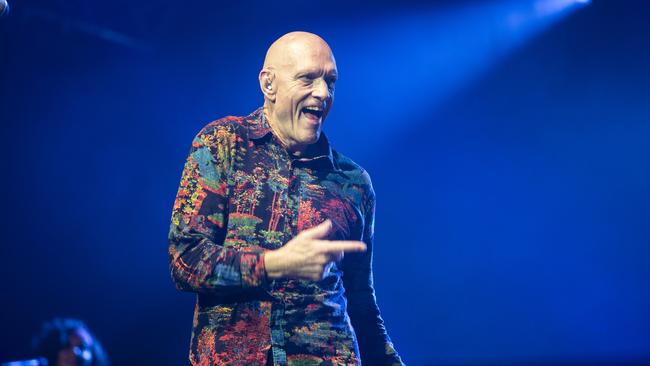
Thanks to the new addition of a T barrier splitting the crowd down the middle, Garrett sang the opening lyrics of US Forces from the sound desk amid a sea of fans before sprinting back to his bandmates, and Rob Hirst’s singular blitzkrieg drum solo during Power and the Passion drew one of the biggest roars of the night.
It was a monumental performance by one of Australia’s greatest bands and a perfect send-off.
Occasional downpours across Saturday meant the thick black sludge surrounding each tent stood no chance of drying out. Much of the grounds became a trampled, muddy mess, but it was nothing new for seasoned Bluesfest attendees, who knew that packing gumboots was as essential as clean undies.
On a program stacked with some of the finest Australian singers working today, Miller-Heidke might top the list. The high-C note she hit in the middle eight of Zero Gravity sent chills through me, while her band – composed of cello, double bass, guitar and backup vocalist Jess Hitchcock – held a rapt Mojo crowd.
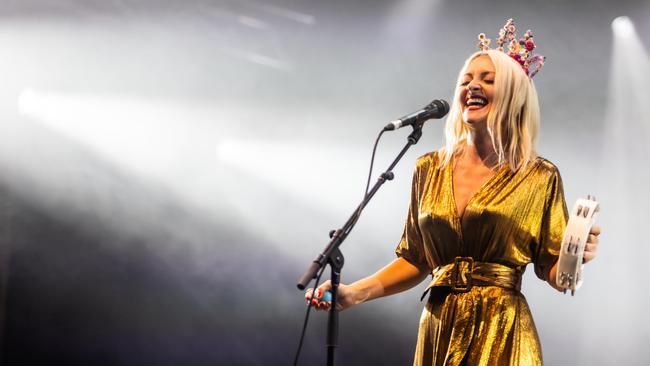
At the Crossroads stage, Arnhem Land hip-hop artist Baker Boy attracted a huge audience who thrilled to his upbeat, party-starting set, complete with back-up dancers, a three-piece band and a powerhouse backing vocalist.
The artist born Danzal Baker has spent the past few years establishing himself as one of the great Australian talents. Covers of Wish You Well and Song 2 rubbed up against material from his debut album Gela.
“This is what I miss – this vibe right here,” he said, looking out at the sea of people in front of him and grinning.
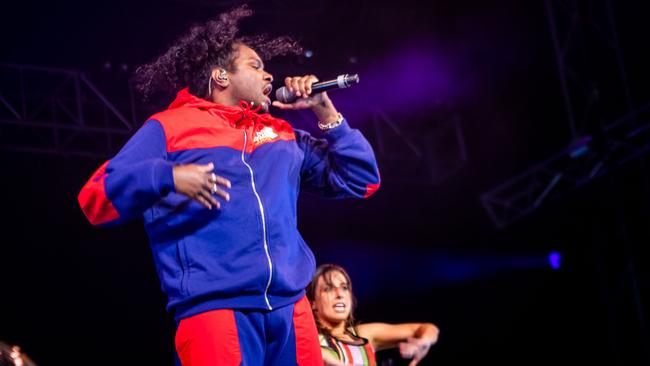
At the same stage a little later, roots artist Xavier Rudd held a similarly large audience with his soulful voice, acoustic guitar and unique percussion set-up as he mixed old favourites with songs from his newly released album, Jan Juc Moon. Barefoot and wearing a red jumpsuit, Rudd radiated a Zen-like calm up there, as though there was nowhere else he was meant to be.
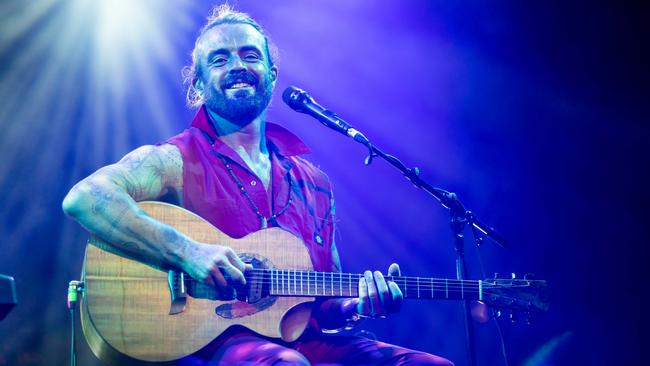
It takes serious gall for a pop artist to walk on to a prime-time main-stage slot at a festival they’ve never attended before, let alone played, while flanked by giant letters spelling out their name. That’s just what Shark did at the Mojo tent, and by any reasonable interpretation she passed the test, such is her poise as one of the few Australian artists working today who can fill arenas.
As Shark and her three-piece band worked through a set stretching back to her 2017 EP and her two chart-topping albums, her station in the firmament was assured by a vocal crowd of all ages, from kids in the front row to greyer heads nodding their appreciation further back.
“This is my first Bluesfest – thank you for accepting me,” she said.
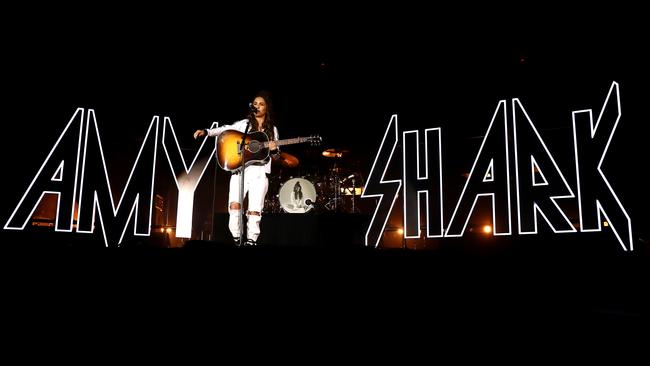
The night was closed by Paul Kelly, whose band is as dependable as a sunrise. In terms of sheer skill, precision and cohesion, they leave just about every other rock band in the shade. Any Saturday night with his song catalogue and those musicians is a night well-spent. Kelly chose a career-spanning set that mixed newer songs such as Northern Rivers with timeless crowd-pleasers such as To Her Door and From St Kilda To Kings Cross.
A positive Covid test on Sunday morning kept me out of the action that day, meaning I missed moments big – such as the delicious Finn family vocal harmonies in Crowded House’s much anticipated headline set – and small, such as Dami Im’s early afternoon appearance at the Juke Joint for her final concert before the pop singer-songwriter becomes a mum next month.
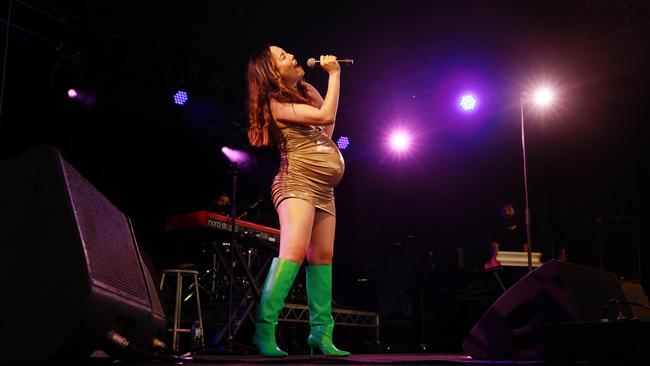
Two days out of three ain’t bad, though, and one of the truly remarkable achievements hit me only once I watched those two red lines form on the testing strip: every single act booked to play across the weekend made it to the stage while successfully dodging the coronavirus.
There was one huge headline headache narrowly avoided, though, and I learned about it only after the fact. On Saturday morning, Kelly’s longtime bassist Bill McDonald tested positive for Covid. A band such as Kelly’s simply cannot perform without a bass player, just as it cannot perform without a drummer.
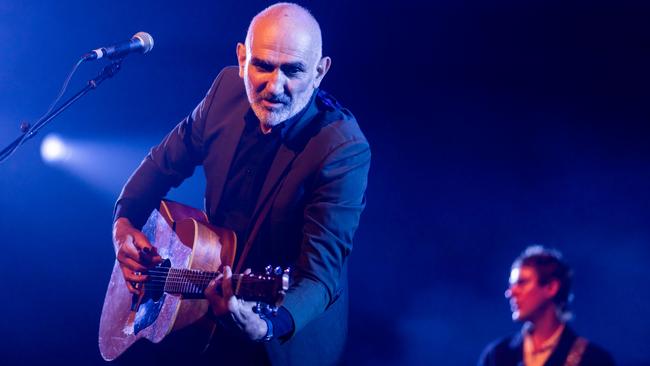
Into the desperate void stepped a musician named Richard Bradbeer, who was already at the festival in Vika & Linda’s band. He accepted the challenge and spent the next eight or so hours drilling his brain and his fingers to learn to play 21 songs from recent concert recordings.
On stage on Saturday night, Bradbeer simply nailed it before a crowd of about 10,000 people. It was a musical miracle, achieved with minimal fuss and maximum professionalism.
But it was that sort of weekend.





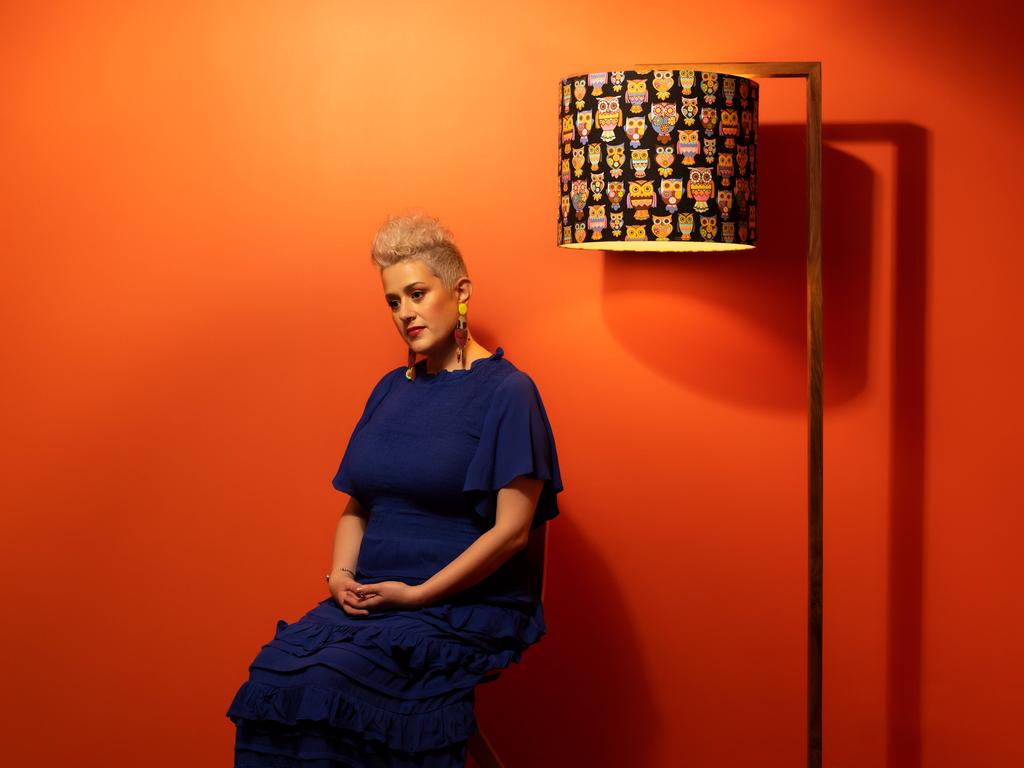
To join the conversation, please log in. Don't have an account? Register
Join the conversation, you are commenting as Logout